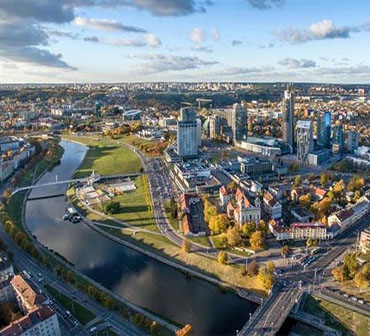About Lithuania
 Lithuania, country of north-eastern Europe, the southernmost and largest of the three Baltic states. Lithuania was a powerful empire that dominated much of eastern Europe in the 14th–16th centuries before becoming part of the Polish-Lithuania confederation for the next two centuries. Vilnius is the capital of Lithuania. This is the largest city of Lithuania as well and second largest city in Baltic region. Lithuania is a modern European country. The culture of the country has several elements that get reflected in their architecture, music, theatre, arts and museums, cinema and so on. The language of Lithuania with Nordic cultural aspects along with Christian traditions is worth exploring in Lithuania.
Lithuania, country of north-eastern Europe, the southernmost and largest of the three Baltic states. Lithuania was a powerful empire that dominated much of eastern Europe in the 14th–16th centuries before becoming part of the Polish-Lithuania confederation for the next two centuries. Vilnius is the capital of Lithuania. This is the largest city of Lithuania as well and second largest city in Baltic region. Lithuania is a modern European country. The culture of the country has several elements that get reflected in their architecture, music, theatre, arts and museums, cinema and so on. The language of Lithuania with Nordic cultural aspects along with Christian traditions is worth exploring in Lithuania.
Why Study in Lithuania
Lithuania has some of the best higher education institutions- colleges and universities. These institutions are known for their high quality of education and teaching level. The graduates from the Lithuania higher education institutions are accepted worldwide for their skills and knowledge. There are three levels of study at Lithuania universities, bachelor’s degree, master’s degree and doctoral degree. There are also integrated programmes available, which combine bachelor’s and master’s level to create one degree.
- Quality of Education
The higher education institutions of Lithuania comprise of excellent research literature, computing and technology equipment’s. Students and researchers are provided a superb learning and research environment. The lectures and classes are being taken by some of the highly qualified faculty members. The higher education qualifications gained from Lithuania are accepted and recognized across the world. Lithuania has adopted the European Credit Transfer System (ECTS), thus making it simpler for international pupils to have their current qualifications correspond to the national credit scheme.
- Economical Country
The cost of living and studying in Lithuania is lower than the other western countries, thus making it a great destination for study, business or tourism.
-Language
Lithuania is the official language of the country. Living in Lithuania gives you an opportunity to learn a new language. Degrees at Lithuania institutions are offered in Lithuania and English. It is more common to find postgraduate degrees taught in English. If you choose to study in a non-native language, you will probably need to provide evidence of your language proficiency. If you do not meet the required standard, your institution may offer language courses to help you improve.
-Work opportunities while studying and post Study
International students have the right to work while studying in Lithuania as long as they are enrolled in a university. EU students can work full-time, meaning up to 40 hours per week. International students from non-EU countries can also work up to 40 hours per week after obtaining the temporary residence permit. The limitation of working time does not apply to international students in doctoral studies.
International students have a possibility to stay in the country for 15 months afterwards to look for a job:
• During the last year of studying, apply for a temporary residence permit renewal for 3 additional months from the day when your course is finished
• After graduating, you also have the possibility to apply for a temporary residence permit for 12 months for job search and self-employment purposes.














